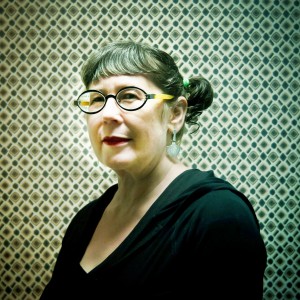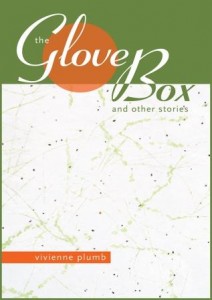 Vivienne Plumb, an Australian currently living in New Zealand, is a playwright, poet, and fiction writer. She has held several residencies, including one in 2004 at the University of Iowa and the 2006 Massey University writers’ residency. She holds a Doctorate in Creative Arts at the University of Wollongong.
Vivienne Plumb, an Australian currently living in New Zealand, is a playwright, poet, and fiction writer. She has held several residencies, including one in 2004 at the University of Iowa and the 2006 Massey University writers’ residency. She holds a Doctorate in Creative Arts at the University of Wollongong.
This week, on the eve of the Sydney launch of The Glove Box & Other Stories, we ask Vivienne about the short fiction that inspires her, about her writing process and her tips for writers.
On short fiction:
There are so many short fiction writers whose work I like, I couldn’t name them all. I guess it’s because I really enjoy reading short fiction – it’s a small bite of text that can be consumed quickly but it can still pack a terrific punch. I love its condensed quality. A few writers I can think of: Alice Munro, Chekhov, Raymond Carver, Katherine Mansfield and Barbara Baynton’s Gothic Australian bush stories.
I remember the first time I read Raymond Carver’s short fiction piece, A Small, Good Thing. (I think that is in the collection, What We Talk About When We Talk About Love.) Carver’s (then) editor, Gordon Lish, tightened those stories to extremity, but I like the way they are.
Most of all I love Kafka’s story, Metamorphosis.
The short fiction that I have read (so far) this year that I have enjoyed the most was a collection Traces by Ida Fink. These stories are about people attempting to do ordinary things under extraordinary circumstances, during World War II, and having to make terrible choices. They are pieces that appear to be simple but are very powerful, and present many complex questions.
I like the condensed quality of the form. But as a writer, I like the fact that short fiction can morph into other mediums and have several ‘lives’. My own story, The Wife Who Spoke Japanese In Her Sleep, has been adapted into a full-length stage play, and short fiction is often adapted into film.
On writing:
I have never been so keen on the ‘where do your ideas come from’ question, although it is one that readers frequently ask. I think that ideas just rise up out of the subconscious. It is being able to recognise a good idea that is the most important factor. I once read an interview with Stephen King, and when asked where he ‘got his ideas from’ he replied, ‘There’s a shop in this little mall that I go to…’
I always work alone, although a writer has the input of an editor, or if you write for the theatre, the director and the dramaturg. Writers tend to write in all kinds of ways, I find. You discover what works for yourself. Much of it is sitting there by yourself and can be boring, although in the movies it’s made to look really romantic.
Most useful piece of advice?
Be true to yourself, write what you feel passionate about.
And bank the cheque straight away! Although online banking now defeats that piece of advice.
You can read our interview with Vivienne Plumb on writing prose poems & microfiction here
